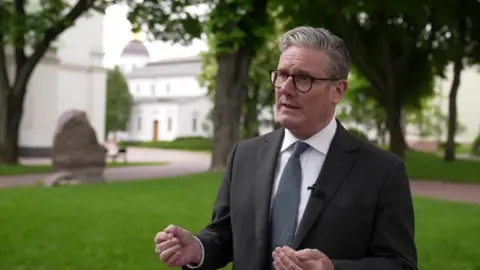In a recent development that marks a potential turning point in the ongoing conflict between Ukraine and Russia, UK Prime Minister Sir Keir Starmer proclaimed that the outcome of the talks held in Kyiv is a “significant moment.” The discussions, attended by key global leaders and facilitated by Ukrainian Prime Minister Volodymyr Zelensky, focused on the urgent need for a ceasefire. Starmer emphasized the importance of unity among the allies during this critical juncture, indicating it is a crucial step, albeit not the final chapter, in seeking peace.
The meeting included prominent figures such as French President Emmanuel Macron, German Chancellor Friedrich Merz, and Polish Prime Minister Donald Tusk. Approximately 30 leaders from across the globe suggested a 30-day unconditional ceasefire starting Monday. They made it clear that if Russia does not comply, they would impose “massive” sanctions on the nation. This coalition, which included leaders participating remotely from countries like Italy, Canada, and the European Commission, reinforced their collective commitment to supporting Ukraine against Russian aggression.
Starmer conveyed his observations on the global landscape, reflecting on the increasing uncertainties in the world, especially in light of various conflicts, including tensions between India and Pakistan. He remarked that the prevailing state of affairs calls for strong leadership, underscoring the necessity for unity among nations to tackle such pressing issues.
The meeting witnessed a concerted effort to unify the stance against Russia. Starmer noted that the leaders presented a more cohesive strategy in demanding a ceasefire alongside a clear response should their demands go unaddressed. He acknowledged that the collective position created during the talks could potentially pave the way for a more favorable outcome. “Material progress” had been achieved during discussions, Starmer stated, maintaining optimism regarding the prospects for a ceasefire.
In a related phone conversation, U.S. President Donald Trump reaffirmed his support for the proposal. Following an earlier rejection from Russian President Vladimir Putin in March, Trump stressed the importance of compliance with the international call for a ceasefire. The global leaders expressed a resolute warning that if their demands were unmet, there would be severe sanctions targeting Russia’s energy and banking sectors, aimed at compelling the Kremlin to reconsider its stance.
Reacting to the discussions, the Kremlin voiced skepticism, highlighting contradictions in the statements from European leaders and suggesting that any cessation of hostilities hinges upon Ukraine’s allies halting arms deliveries to the country. However, European leaders had already dismissed this precondition for negotiations, asserting their commitment to support Ukraine.
The talks in Kyiv coincided with a significant symbolic event, occurring just a day after numerous world leaders attended Russia’s Victory Day celebrations in Moscow, which commemorated the defeat of Nazi Germany in World War II. Starmer noted that it was particularly important for the allies to come together in Ukraine at this moment, reiterating the values that were once fought for 80 years ago. He emphasized that such unity was essential in the fight against tyranny and oppression in contemporary times.
Addressing concerns about rising global tensions, Sir Keir acknowledged the shift in the nature of defense and security in today’s world but conveyed a sense of duty and focus regarding the steps that need to be taken to ensure preparation for potential future scenarios. The “coalition of the willing,” an initiative by the UK and France, aims to strengthen any potential peace deal with security guarantees, which includes the possibility of deploying peacekeeping troops in Ukraine.
Although the outcome of the talks has set a hopeful tone, Sir Keir Starmer expressed an understanding that further efforts are required to achieve lasting peace, urging all parties to continue working towards this crucial goal.



